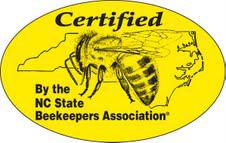When You See This Label You Know It Is the Real Deal
The North Carolina State Beekeepers Association has developed a Certified Label for its members who agree to adhere to certain standards.
To qualify for the program honey must be pure honey and not adulterated with anything. If the beekeeper implies that it is produced locally, that must be true.
And, if the honey is promoted to be from a specific floral source, such as the premium sourwood honey that is common in Western North Carolina, at least 51 percent of the identifiable pollen, based on accepted laboratory testing procedures, in the honey must be from the sourwood tree.
“When you see this label, “Certified by the North Carolina State Beekeepers Association,” affixed to a jar of honey, you will know that it is good honey and pure,” said Danny Jaynes, President of the NC State Beekeepers Association.
“We hope this will clarify confusion that may exist in the market place about the quality of honey, “ Jaynes added. “By agreeing to the terms of this program, our members agree that the honey they offer for sale will be true to the information on the label and nothing less.”
While the U.S. Food and Drug Administration has developed standards for a wide variety of foods, from lard to beer, it refuses to define a honey standard despite the fact that beekeepers have been asking it do so for half a century.
The North Carolina State Beekeepers adopted a standard of honey two years ago. The standard defines honey as the natural, sweet substance produced by honey bees from the nectar of plants. Honey is primarily composed of fructose, glucose and water. It also contains other sugars as well as trace enzymes, minerals, vitamins, amino acids, and pollen. The color of honey varies from nearly colorless to dark brown. The consistency can be fluid, viscous, or partly to entirely crystallized. The flavor and aroma vary, but are derived from the plant origin.
U.S. beekeepers produce about 150 million pounds of honey each year; however, more than 350 million pounds are consumed in the U.S. market place. This demand for 200 million pounds of honey imports each year provides a strong incentive for some unethical brokers to cut corners such as adulterating the product or bringing in cheap imports from China illegally without having to pay the tariff on Chinese honey.
The certified label program by North Carolina beekeepers is a way to inform the public of the excellence and purity of honey bearing this certified label.
An application for the program is available on the NCSBA website. Members should submit an application to their regional NCSBA representative, or an officer. Contact information is available through either the Yellow Book or the NCSBA website. For more information, you may send an inquiry to nchoneyboard@gmail.com
